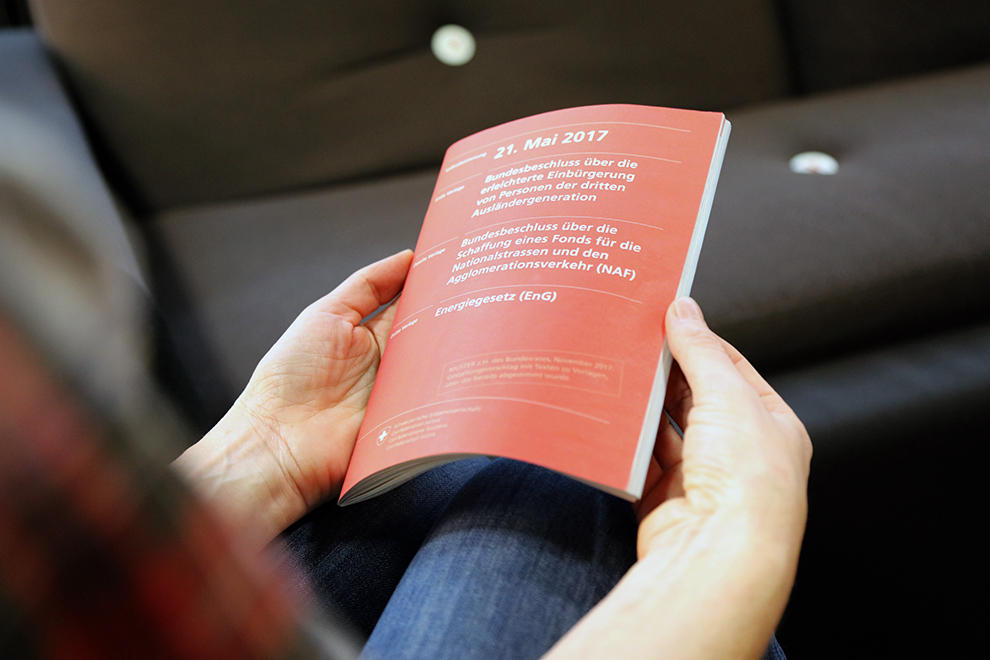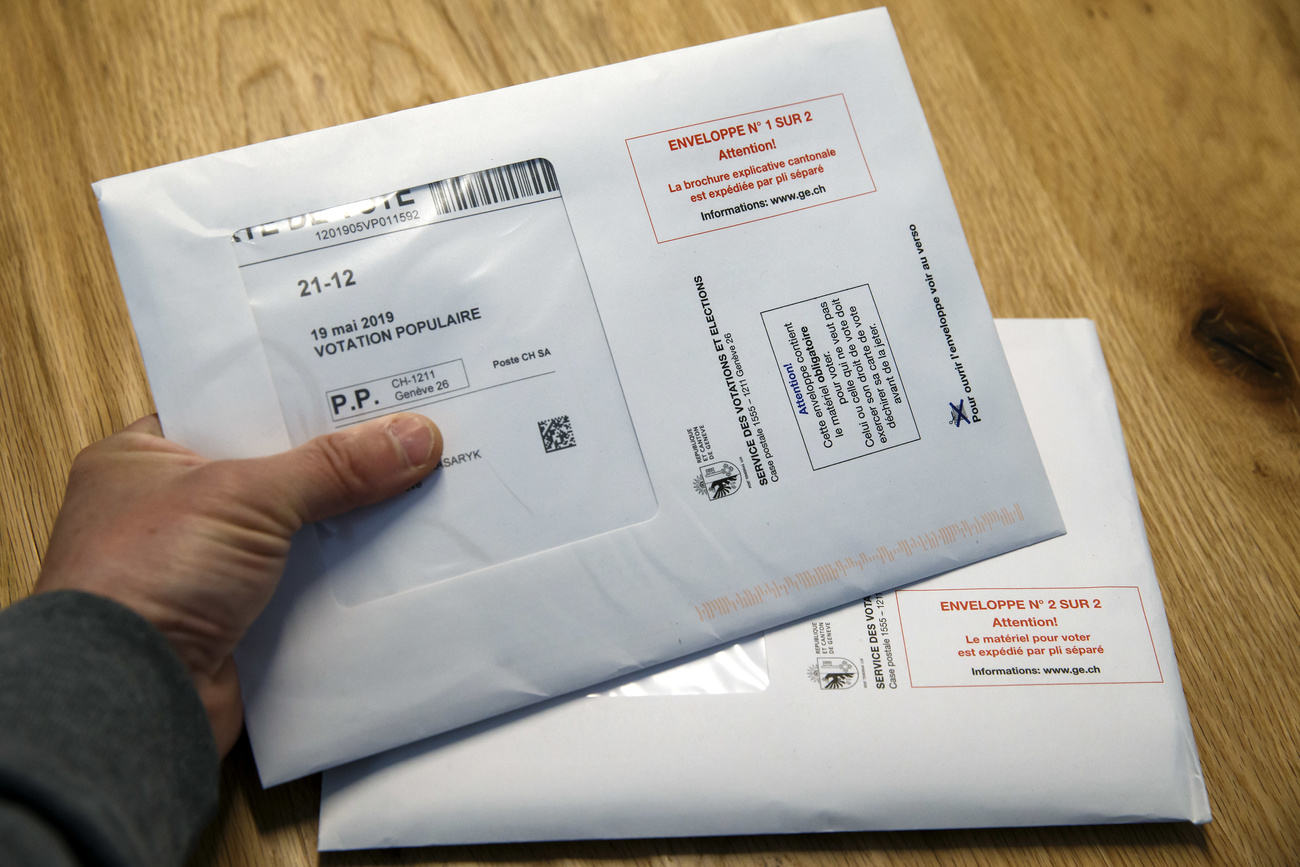Why can’t voting papers be sent to the Swiss Abroad earlier?

A quarter of Swiss citizens who live abroad struggle to return their voting papers in time – with potentially serious consequences for democracy. Various solutions have been proposed, but the most obvious ones turn out to be illegal.
The Swiss go to the polls four times a year to have their say on a range of issues. On June 13, for example, they will decide on the national climate change strategy and an anti-terrorism law, among other topics. Within Switzerland, the system works like clockwork; outside Switzerland, it doesn’t.
Five weeks are allotted for sending ballot papers to Swiss expats scattered around the world (and for them to send them back) and in many cases this isn’t enough.
Parliamentarian Andri Silberschmidt recently raised the issue in a parliamentary questionExternal link. He called not only for voting envelopes to be sent in diplomatic bags to embassies on a trial basis but also for the five-week dispatch deadline to be extended.
In February the government gave the go-ahead for a trial using diplomatic couriers. This will be launched in Australia, Brazil and Thailand in the coming weeks.

More
Swiss embassies to deliver voting papers to some expats in trial
However, the government rejected Silberschmidt’s second suggestion, saying delays could not be avoided “as long as voting documents are sent physically and votes are cast by post”.
The envelopes for votes and elections that Switzerland sends abroad are entrusted to foreign postal services, and the government’s basic position is “if something goes wrong, it’s out of our control – don’t blame us”.
Extent of the problem
The problem has existed since 1992, when postal voting was introduced for the Fifth Switzerland, as the Swiss Abroad are known. Systematic delays led to intensive efforts by the Organisation of the Swiss Abroad (OSA) to introduce e-voting. For a long time this lobbying was successful – until 2019, when the idea was shelved following security concerns. So for the foreseeable future, postal voting will remain the only option.
Swiss Post doesn’t keep statistics on how many envelopes arrive late, but an estimate is possible. Of the total 776,000 Swiss citizens who lived abroad last year, just over a quarter (207,000) were registered to vote. About 191,000 lived in countries where the stated postal delivery times were not fast enough to get the voting envelopes there and back in the worst case scenario (see second map below).
If we follow the average and assume that a quarter of those 191,000 Swiss abroad in “problem” countries are registered to vote, that means almost 50,000 Swiss Abroad will possibly not be able to participate in Swiss votes or elections.
This partly explains why voter turnout among the Swiss Abroad remains significantly lower than in Switzerland. The average turnout for the past ten ballots is 28%, compared with 45% in Switzerland.
Turnout is important because in a democracy it’s not the registered voters who decide but the actual voters. In this case, those 50,000 registered voters – given a turnout of 28% – become about 14,000 actual voters.
This number can make a difference. After all, Swiss democracy regularly produces very close results. In the past ten years four referendums have been decided by fewer than 20,000 votes: the mass immigration initiative in 2013, the Radio and Television Act in 2014, pension reforms in 2017 and buying new fighter jets in 2020.
What’s more, we haven’t counted the numerous cantonal votes, some of which have also been decided by extremely narrow margins. Filippo Lombardi, the father of the Swiss Abroad ActExternal link, missed re-election to the Senate in 2019 by just 45 votes – votes which he probably would have received from the diaspora.
Those who are in practice excluded and disenfranchised are obviously frustrated. Their vote matters to them and their participation is, after all, intended. But Switzerland’s system is letting them down. It is failing because of the practical pitfalls of sending letters in the age of digitalisation. The fact that nothing has changed for almost 30 years also means that the government accepts this.

More
Swiss Abroad furious about missing voting documents
Swiss Post gives the delivery times to individual countries. We have shown these in two maps. The first shows a “best case, fastest delivery” world.
The second map shows a “worst case, slowest delivery” world.
Barring a pandemic, things generally move quickly in Europe, with the exception of the Czech Republic and Hungary. In the best-case scenario, letters also travel quickly to large parts of Asia, Australia, Canada and North and East Africa. The longest delivery times are to the US, South America and large parts of Africa.
Why not post earlier?
Logic would suggest that the earlier something is sent, the sooner it arrives. So why not simply send the voting papers earlier, as Silberschmidt is calling for?
While the government and Swiss Post blame foreign postal services for delays, the problem is in fact entirely homemade.
Legally, cantons and municipalities are not allowed to dispatch ballot papers earlier than five weeks before the vote. First, there is the Federal Act on Political RightsExternal link, which states that “persons eligible to vote shall receive the documents required to cast a valid vote under cantonal law (ballot paper, polling card, official voting envelope, validation stamp, etc.) at least three and no more than four weeks prior to the polling day”. If it comes to a second round of voting in the cantons, the deadlines are often shorter.
Second, there is the Ordinance on the Swiss Persons and Institutions AbroadExternal link, which allows papers to be sent out “at the earliest one week before the official dispatch”. So five weeks in all.
We asked all 26 cantons whether they were sending out the papers as soon as they were legally allowed to. The answer everywhere was “yes” or “if possible, yes”. The response from canton Lucerne is typical: “The government usually delivers the voting documents 6.5-7 weeks before the vote. After that, the voting cards are printed in canton Lucerne and the documents are packed for dispatch abroad. They are delivered to the post office about 5.5 weeks before voting Sunday.”
Then came Covid-19. Delays increased worldwide. As a result the government let the cantons dispatch voting papers one week earlier, i.e. six weeks before the ballot. The fact that this extra week could be pulled out of a hat is remarkable in itself – after all, this possibility also would have existed during the 30 previous years.
Room for improvement
So what can still be improved? One thing is clear: each additional day that voting papers are sent out earlier has a positive influence on their time of arrival. Also, the 11 cantons that do the dispatching centrally and don’t delegate it to the municipalities tend to be more successful.
In the pilot test for an embassy dispatch, the envelopes will be sent abroad directly from the Federal Chancellery. This will save them the detour via the cantons and municipalities.
Priority dispatch could also improve the situation but would incur enormous costs – which would fall mainly on the cantons and municipalities. Such a measure is therefore unlikely to be enforceable throughout Switzerland. In view of the relatively low voter turnout, privileged dispatch to the Swiss Abroad would also be politically difficult – after all, 70% of all voting envelopes sent abroad are never used.
However, many voters abroad already use courier services or expensive express services, at least for the return direction. For them, participation in Swiss democracy is sometimes worth up to CHF120 ($132) in postage. Silberschmidt’s parliamentary question has also taken this into account. “A possible cost-sharing for Swiss Abroad in remote areas can be examined,” it says. Still, it would be cheaper simply to get to the post office earlier.
We have taken the above map with the worst-case delivery and changed it assuming the envelopes were sent three weeks earlier:
Even in the worst-case scenario, round-trip shipping to virtually every country would work on time.
But would that even be possible? It turns out that the little red voting booklet, which sets out the various positions and arguments at stake, is the real spanner in the works.
The voting papers could be sent out – and sent back – without the booklet much earlier, with voters then having to find the voting information online. But according to a Federal Court ruling, it’s compulsory for voters to have the texts of the laws on which they are voting. These are found… in the voting booklet.
The Federal Chancellery drew our attention to that fact. We had asked them how many weeks could be gained by not sending out the voting booklet. They didn’t say, but they did point out that such an idea would require some changes in the law.
“The earliest date at which these documents may be sent is legally regulated,” explained Beat Furrer, spokesman for the Federal Chancellery. “Today it would be legally possible to send out the voting booklet before the voting documents, but not the other way round.”
(Adapted from German by Thomas Stephens)

In compliance with the JTI standards
More: SWI swissinfo.ch certified by the Journalism Trust Initiative













Join the conversation!